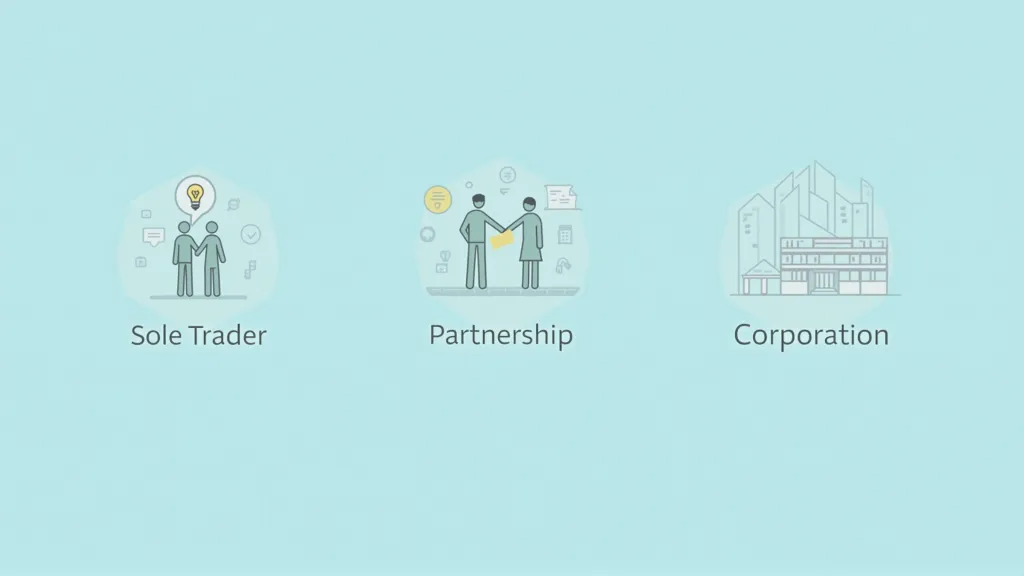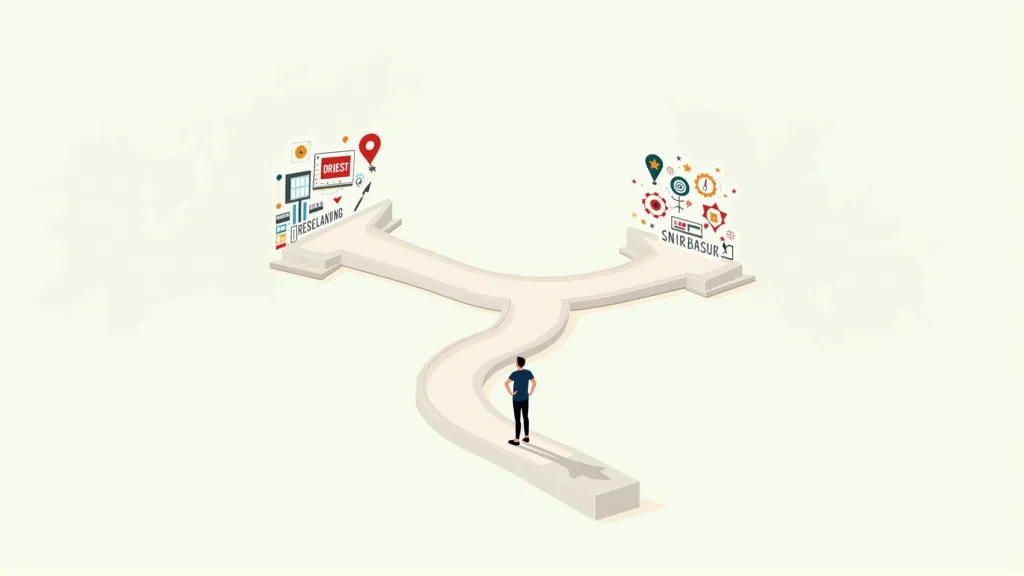Imagine sipping coconut water on a beach in Bali while wrapping up a client call—or logging into a team meeting from a cozy Airbnb in Lisbon. Sounds dreamy, right? That’s the digital nomad life many people crave: location freedom, flexible hours, and the chance to turn the world into your office. With so many digital nomad career paths available today, this lifestyle is more achievable than ever.
But here’s the catch: there’s a lot of confusion around what it actually means to work this way. You’ll hear terms like freelancer, remote employee, and entrepreneur thrown around—often interchangeably. Yet, each path has its own rhythm, responsibilities, and rewards.
That’s where this guide comes in.
We’ll break down these three common digital nomad career paths so you can clearly see the differences. You’ll explore the pros and cons of each option, get real-life examples, and learn how to choose the route that best suits your lifestyle goals.
👉 Want to simplify your digital nomad life even more? Check out our main guide: Digital Nomad Tips to Simplify Life on the Road
Understanding the Foundation: Self-Employment & Its Forms

Before we dive into the details of freelancing, remote work, or starting your own business, let’s zoom out for a second.
What Is Self-Employment?
At its core, self-employment means you work for yourself. You don’t earn a paycheck from a company—instead, you generate income from your own services or business. It’s a broad category that includes:
- Freelancers offering skills like writing, design, or coding
- Entrepreneurs running their own business or startup
- Small business owners, consultants, and creators
You call the shots, set your hours, and decide where and how you work. For digital nomads, this kind of flexibility is gold.
A Quick Look at Business Structures (Especially for Entrepreneurs)
If you’re leaning toward entrepreneurship, understanding business structures helps you pick the right setup for your goals:
- Sole Trader (Sole Proprietor)
You’re the only owner. Setup is simple and fast.
Heads up: You’re personally responsible for debts and liabilities. - Limited Company (or LLC)
Your business is a separate legal entity.
This offers limited liability (your personal assets are protected), but you’ll deal with more paperwork and possibly higher upfront costs.
Bonus: You may get tax benefits depending on your location. - Partnership
Two or more people own the business together.
It works like a sole proprietorship but shared among partners.
Make sure roles, contributions, and profits are clearly agreed upon.
The Remote Employee: Stability with Location Flexibility

If you want the security of a traditional job and the freedom to work from anywhere, being a remote employee might be your sweet spot.
What Is a Remote Employee?
A remote employee works for a company but doesn’t go into an office every day. You’re still a team member—just not in the same building. Your employer handles the usual stuff like payroll, taxes, benefits, and IT support. You’ll likely have set hours or core availability, especially if your team spans multiple time zones.
Why This Path Works for Some Digital Nomads
Here’s why a remote job can be a great stepping stone into the nomad lifestyle:
- Steady paycheck: You’ll have reliable income, often paid on a regular schedule.
- Employee benefits: Health insurance, paid time off, retirement contributions—yep, they’re often part of the deal.
- Fewer admin headaches: Your employer handles taxes, HR, and tech setups.
- Potential for sponsored visas: Some companies offer international relocation or remote work support.
The Trade-Offs to Consider
It’s not all palm trees and paychecks. Here’s what to keep in mind:
- Less control over your work schedule and the type of projects you take on.
- Company rules may restrict where you can work from (hello, time zone compliance).
- Your career growth and income potential might move slower than if you were self-employed.
- You still answer to a boss—and might need to clock in at odd hours depending on your team’s location.
The Freelancer: Autonomy, Variety, and Client-Based Work

Craving control over your time and the kind of work you do? Freelancing could be your jam.
What Is a Freelancer?
A freelancer is an independent worker who takes on short- or long-term projects for different clients. You’re not tied to one company, and you typically get paid per hour, project, or retainer. Think writers, designers, developers, virtual assistants—you name it.
You can freelance full-time or as a side hustle while testing the nomad waters.
Freelancer vs. Contractor: What’s the Difference? Digital Nomad Career Paths
While the terms are often used interchangeably, there’s a subtle difference:
- Freelancers juggle multiple clients, often with short-term or creative projects (like blog writing or branding).
- Contractors usually have one client at a time for longer gigs, especially in industries like tech or consulting.
Both give you more independence than traditional jobs—but freelancers usually have more flexibility.
Why Freelancing Appeals to Digital Nomads
- Ultimate freedom: Choose your projects, clients, and work hours.
- Unlimited earning potential: The more you work (or charge), the more you earn.
- Skill diversity: You’ll gain experience fast by working with various industries and teams.
- Work from anywhere: As long as there’s Wi-Fi, you’re golden.
Challenges You’ll Need to Navigate
- No guaranteed paycheck—you eat what you hunt.
- You’re the marketing, sales, finance, and legal departments all rolled into one.
- No benefits like health insurance or paid time off.
- Staying productive and managing multiple clients takes solid discipline.
The Entrepreneur: Innovation, Scalability, and Building a Vision

If you dream of building something big, making an impact, and calling all the shots, entrepreneurship might be your path to digital nomad freedom.
What Is an Entrepreneur?
Entrepreneurs build businesses from the ground up. Their goal? Create something scalable. That means building systems, hiring teams, and eventually stepping back so the business can run (and grow) without them doing all the day-to-day tasks.
It’s about thinking big, taking risks, and being ready to face failure—and success.
Entrepreneur vs. Solopreneur: What’s the Difference?
Let’s clear this up:
- Entrepreneur: Focuses on building teams, systems, and businesses with potential for scale or sale. Think “startup founder” vibes.
- Solopreneur: Runs the whole show solo—intentionally. They’re in it for the freedom, not the employees.
Both offer freedom, but the mindset and growth plans differ.
Why Entrepreneurs Thrive as Digital Nomads
- Total freedom: You set the vision, goals, and location.
- Scalability: Build systems that generate passive or semi-passive income.
- Deep fulfillment: You’re creating something that can grow, impact others, and maybe even sell someday.
- Eventually location-independent: Once your business is stable, you can manage it from anywhere.
The Flip Side
- High risk—startups often fail before they succeed.
- Demanding early on: Expect long hours, hustle, and uncertainty.
- Upfront investment: Time, money, and emotional bandwidth.
- Leadership required: You’ll need to manage people, plans, and problems.
The Digital Nomad: A Lifestyle Choice, Not Just a Job Title

Before we wrap, let’s clear one thing up: being a digital nomad isn’t a job. It’s a lifestyle.
What Does “Digital Nomad” Really Mean?
A digital nomad is someone who works remotely while traveling. That might mean:
- Bouncing between countries every few weeks.
- Living in one place for months (aka “slowmad” life).
- Choosing work that allows location flexibility, powered by Wi-Fi and a laptop.
How It Connects with the Career Paths
You can be a digital nomad as a:
- Remote employee (as long as your employer allows it),
- Freelancer (more freedom, more hustle), or
- Entrepreneur (highest potential, highest risk).
Choosing Your Perfect Digital Nomad Career Path: A Comparative Analysis

You’ve seen the options. Now it’s time to match them to you.
Key Comparison Factors for Digital Nomad Career Paths
Let’s break it down side-by-side:
| Factor | Remote Employee | Freelancer | Entrepreneur |
|---|---|---|---|
| Income Stability | High | Medium | Low (initially), High (long-term) |
| Autonomy & Control | Medium | High | Very High |
| Risk vs. Reward | Low Risk, Steady Reward | Medium Risk, High Potential | High Risk, High Reward |
| Admin Load | Low | Medium | High |
| Setup Time/Cost | Low | Medium | High |
| Skill Needs | Job-specific | Diverse (client work, time management) | Broad (leadership, strategy, sales) |
Ask Yourself These Questions
To help you decide, here are a few gut-check questions:
- Do I crave security or flexibility more?
- Can I handle irregular income, or do I need a steady paycheck?
- Am I okay working under someone else’s direction, or do I need to lead?
- Do I want to build something long-term or just work from anywhere?
- How much admin or sales work am I comfortable handling?
- How important is it for me to travel often, or would I prefer a hybrid lifestyle?
There’s no one “right” path—just the right path for you right now.
👉 Still figuring things out? Check out our Digital Nomad Tips to Simplify Life on the Road to keep your journey inspired and stress-free.
Practical Steps Towards Digital Nomad Career Paths
Ready to move from dreaming to doing? Here’s where to start:
- Remote Employees: Update your resume and LinkedIn, focus on remote-first companies, and check their policies on international work.
- Freelancers: Build a solid portfolio, define your niche, set your rates, market yourself, and learn the basics of contracts, invoicing, and taxes.
- Entrepreneurs: Create a business plan, test your idea in the real world, explore funding if needed, and start building systems from day one.
- All Digital Nomads: Research nomad-friendly countries, check visa requirements, and never underestimate the importance of strong Wi-Fi.
Your Journey Starts Now: Digital Nomad Career Paths
Choosing between freelancer, remote employee, or entrepreneur isn’t just about a job—it’s about designing a life that aligns with your values, goals, and appetite for adventure.
- Freelancers enjoy flexibility and variety.
- Remote employees value structure and stability.
- Entrepreneurs chase vision, freedom, and long-term growth.
Each path fits into the digital nomad lifestyle in different ways, and none is “better” than the other. It’s all about what fits you best.
So take a moment. Reflect on what you truly want. Then take one small step toward the life you’ve been imagining.
👉 Need help starting the nomad life? Check out this guide full of practical tips to simplify life on the road.



